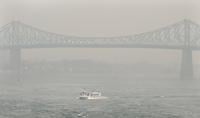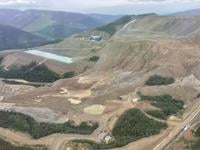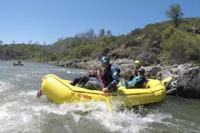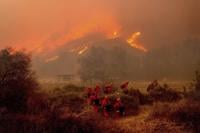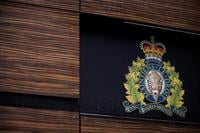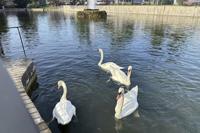OTTAWA - The number of forest fires burning across Canada crept higher over the last week and more dangerous air quality warnings were issued in parts of Ontario and Quebec Sunday.
The Canadian Interagency Forest Fire Centre, known as CIFFC, reported 465 active fires burning across the country, including 240 that are out of control. Almost one-quarter of those fires are in Quebec, and Environment Canada warned wind patterns were causing smoke from some of those blazes to settle over the western part of the province as well as eastern Ontario.
The smoke and fires prompted the cancellation of an Ironman triathlon race in Mont Tremblant, Que. shut down youth soccer and baseball programs in Ottawa and Montreal and compelled city officials in Ottawa and its neighbouring city of Gatineau, Que., to close outdoor pools and declare beaches off limits to swimming.
About 3,700 athletes were to take part in the triathlon at Quebec's popular resort about 130 km northwest of Montreal. But when they arrived Sunday morning, they found a coating of ash on their bicycles and a thick haze floating in the air.
"In working with provincial health authorities due to the ash alert and high concentrations of fine particles causing poor Air Quality Index (AQI) spreading across the Tremblant region, we regret to share that Sunday鈥檚 IRONMAN 70.3 Mont-Tremblant triathlon has been cancelled for the safety of all involved," race organizers posted on their website.
The record-breaking fire season and expectation of continued hot, dry weather has some cities also cancelling or reconsidering fireworks planned for Canada Day next weekend.
Gatineau disallowed fireworks planned for Saturday for the Saint-Jean-Baptiste holiday and is also barring them on July 1. North Bay, Ont. reported Friday it had considered cancelling fireworks for Canada Day but for now will allow them to go ahead.
North Bay was among the cities blanketed by smoke again Sunday.
Environment Canada said the air quality index in eastern and northern Ontario, including Ottawa, North Bay and Sudbury, was above 10 on Sunday, which is considered to be very high risk. Gatineau, Montreal and its suburbs were given the same rating.
Vulnerable people are advised to avoid strenuous outdoor exercise entirely while everyone else should severely limit it.
"People with lung disease such as asthma, heart disease patients, older adults, children, pregnant people, and people who work outdoors are at higher risk of experiencing health effects caused by wildfire smoke," the weather agency said in its air quality warnings.
The agency said the air quality in Quebec City would also pose a high risk throughout Sunday. Winnipeg and the northern Manitoba town of Flin Flon may see high risk air quality Sunday afternoon and evening.
The poor air quality is expected to dissipate in Manitoba and northern Ontario by Monday but may remain above safe levels in eastern Ontario and western Quebec until at least Monday night.
Chief Public Health Officer Dr. Theresa Tam said last week the biggest risk from wildfire smoke is the fine particulate matter, known as PM2.5 than settles in your lungs when inhaled and causes inflammation and irritation.
She said a well-fitted, high-quality face mask, like an N95, can help reduce the amount of PM2.5 someone inhales.
The number of fires actively burning has jumped over the last week. CIFFC reported 412 active fires with 208 out of control on June 18. Ontario and Alberta saw the biggest spikes in fire activity.
Nearly 72,000 square kilometres of forest land has burned this year so far, an area nearly four times the size of Lake Ontario.
There are differing reports on the exact record for the most amount of land burned from wildfires in a single year in Canada, but all indexes show this year is rapidly closing in on becoming the worst fire year the country has ever seen.
More than 13,000 square kilometres burned over the last seven days, or on average an area three times the size of the City of Toronto evach day.
The majority of fires in April and May were connected to human activities such as campfires. But 70 per cent of the 1,053 fires started since June 1 were caused by lightning strikes.
This report by 香港六合彩挂牌资料 was first published June 25, 2023.


